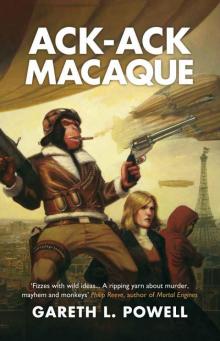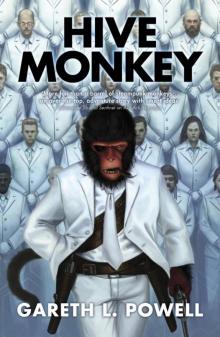- Home
- Gareth L. Powell
Ack-Ack Macaque
Ack-Ack Macaque Read online
Also by Gareth L. Powell
The Recollection
Silversands
The Last Reef
First published 2012 by Solaris
an imprint of Rebellion Publishing Ltd,
Riverside House, Osney Mead,
Oxford, OX2 0ES, UK
www.solarisbooks.com
ISBN: (epub) 978-1-84997-468-4
ISBN: (mobi) 978-1-84997-469-1
Copyright © Gareth L. Powell 2012
Cover by Jake Murray
The right of the author to be identified as the author of this work has been asserted in accordance with the Copyright, Designs and Patents Act 1988.
All rights reserved. No part of this publication may be reproduced, stored in a retrieval system, or transmitted, in any form or by any means, electronic, mechanical, photocopying, recording or otherwise, without the prior permission of he copyright owners.
This is a work of fiction. All the characters and events portrayed in this book are fictional, and any resemblance to real people or incidents is purely coincidental.
For Edith and Rosie, with love.
In September 1956, France found herself facing economic difficulties at home and an escalating crisis in Suez. In desperation, the French Prime Minister came to London with an audacious proposition for Sir Anthony Eden: a political and economic union between the United Kingdom and France, with Her Majesty Queen Elizabeth II as the new head of the French state.
Although Eden greeted the idea with scepticism, a resounding Anglo-French victory against Egypt persuaded his successor to accept and, despite disapproving noises from both Washington and Moscow, Harold Macmillan and Charles de Gaulle eventually signed the Declaration of Union on 29th November 1959, thereby laying the foundations for a wider European commonwealth.
And now, one hundred years have passed...
PART ONE
DIGITAL GHOSTS
Des hommes raisonnables? Des hommes détenteurs de la sagesse? Des hommes inspirés par l’esprit?... Non, ce n’est pas possible.
(Pierre Boulle, La Planète des Singes)
BREAKING NEWS
From The European Standard, online edition:
King Injured In Grenade Attack
Assailant targets royal motorcade
PARIS, 11 JULY 2058 – The King and the Duchess of Brittany have been injured by an explosion on the streets of Paris.
An air ambulance flew His Majesty King William V, ruler of the United Kingdom of Great Britain, France, Ireland and Norway, and Head of the United European Commonwealth, to a private hospital last night, where surgeons battled for three hours to save his life.
The royal couple were on their way to a formal reception at the Champs-Elysées Plaza Hotel, where they were due to announce plans for next year’s Unification Day celebrations, which will mark the centenary of the merger between France and Great Britain.
Eyewitness reports say that shots were fired as the royal motorcade turned onto the Champs-Elysées and a missile, possibly a rocket-propelled grenade, struck the royal limousine.
Following the explosion, police shot dead an unidentified assailant, who died at the scene.
The King and the Duchess were cut from the wreckage by emergency services and rushed to hospital by helicopter. In a statement issued this morning, Buckingham Palace confirmed that the King suffered a critical head injury, but is now resting comfortably after surgery to relieve pressure on his brain. It is not known if the King’s soul-catcher suffered any damage.
Her Grace Alyssa Célestine, The Duchess of Brittany, received treatment for minor injuries, and reportedly spent the night by her husband’s bedside.
This latest tragedy comes only a year after the King’s son was involved in a helicopter crash while serving in the South Atlantic. The prince survived his ordeal, but seven of his colleagues were not so fortunate.
Since news of the Paris attack broke, the Palace has been inundated with messages of sympathy and concern.
As speculation rises, no republican terror group has yet claimed responsibility and official sources have so far declined to comment.
The investigation continues.
Read more | Like | Comment | Share
Related Stories
World leaders express shock at Paris attack
PM blames dissident republican terror groups
Next year’s centenary celebrations to be postponed?
Hong Kong sovereignty negotiations “in trouble”
TuringSoft: Céleste Tech fails in hostile takeover bid for rival computer company
Nuclear tensions on Indo-Chinese border?
Countdown to launch of first privately funded “light sail” probe
Global population hits 8.5 billion
CHAPTER ONE
VICTORIA AT PADDINGTON
THE MOMENT VICTORIA Valois stepped down from the Heathrow train, she saw the detective waiting for her at the ticket barrier. He was there to escort her to her dead husband’s apartment. Slowly, she walked towards him. Fresh off the train, after her flight from Paris, she still wore the thick army surplus coat and heavy boots she’d pulled on that morning. As she walked, she could feel the retractable quarterstaff in her coat pocket bump against her thigh. She sniffed the air. Under different circumstances, it might have been nice to have been back in London. Paddington’s concourse smelled the way she remembered, of engine grease and fast food. Trains pulled in and out. Metal luggage trolleys rattled. Pigeons flapped under the glazed, wrought-iron roof.
She stopped in front of the barrier.
“I’m Valois.”
“Welcome to London, Miss Valois. I’m Detective Constable Simon Malhotra. We spoke on the phone.” He glanced behind her. “Do you need any help with your bags?”
Victoria shook her head.
“I haven’t brought any. I’m hoping this won’t take long.”
“Ah, of course.”
Outside the station, the pavements were slick with rain. He led her to his car and opened the passenger door.
“Shall we go straight there, or do you need to freshen up first?”
Victoria ducked into the proffered seat. The car was an old Citroën, its interior warm with the autumnal odours of cold coffee, damp clothes and cheap pine air freshener. A half-eaten croissant lay on the grimy dashboard, wrapped in a napkin. She wrinkled her nose.
“Let’s just get this over with, shall we?”
Malhotra closed the door and hurried around to the driver’s side.
“Okay.” He settled behind the wheel and loosened his tie. He pressed the ignition and Victoria heard the electric engine spin up, whining into life. The wipers clunked back and forth. The indicator light ticked, and Malhotra eased the car out into the late morning traffic.
Victoria let her head fall back against the headrest. As the skyliner ground its way across the Channel, she hadn’t bothered trying to sleep. The bunk in her cabin had remained undisturbed. She’d spent most of the night in a chair by the porthole, using her jacket as a blanket, watching the rain clump and slither on the glass, smudging the lights of the other gondolas; asking herself the same question, over and over again: How could Paul possibly be dead?
Malhotra took them out onto Edgware Road, then south past Marble Arch, and onto Park Lane. The road and sky were as grey and wet as each other.
“So.” He glanced across at her as they passed the gaunt trees and black railings of Hyde Park. “Is this your first time in London?”
Victoria didn’t bother turning her head.
“I worked for three years as the London correspondent for Le Monde,” she said. “I met my husband here. He worked for Céleste Technologies. We moved to Paris when they offered him a position there.”
M
alhotra sucked his teeth. He seemed embarrassed to have brought up the subject.
“Your husband. Yes, of course.”
They came to Hyde Park Corner and the Wellington Arch, with its statue of a black iron chariot. Suddenly, they were in five lanes of traffic. Rain fell in front of bright red brake lights. Black hackney cabs jostled for position. Absently, Victoria touched her fingers to the side of her head, and felt her nails scrape the thick ridge of scar tissue concealed behind the curtain of her hair.
“We separated a few months ago. He moved back here.”
“But you’re from Paris?”
“Originally, oui, c’est ca.”
“And now you live on a skyliner? That must be exciting!”
She shrugged at his enthusiasm. A double-decker bus drew alongside, windows steamed.
“It’s okay.” She watched the rain coat the brick and stone of London: capital city of the United European Commonwealth, site of the European Parliament, and seat of His Majesty King William V. She hadn’t been back here in over a year.
Oh, Paul.
She took a long breath.
“Can you tell me something, Detective Malhotra?”
The young man spared her another glance.
“Sure, if I can.”
“How did he die?”
Ahead, a traffic light turned red. Malhotra downshifted the gears and brought the car to a standstill.
“He was murdered.”
Victoria squeezed her fists together in her lap.
“I know that. I just don’t know how he died.”
The light flickered to amber, then green. Malhotra let out the clutch and the Citroën’s electric motor pulled them forward. He took a right onto Brompton Road, and then a left onto Sloane Street. Victoria’s neural software tracked their progress via an online map. In her mind’s eye, a blinking red arrow marked her current position, the streets laid out in tangles around it. If she wanted to, she could zoom right in to pavement level, or right out until the world seemed the size of a football held at arm’s length. She would never be lost. As long as she had a wireless connection, she would always know exactly where she was.
“Are you sure you want to know?” Malhotra’s tone suggested he was trying to protect her. Victoria rubbed her eyes with forefinger and thumb, dispelling the map display. To hear the grisly details of her husband’s murder was pretty much the last thing she wanted right now. Yet that old journalistic instinct itched at her and wouldn’t let go. She had to know the full story, whatever the cost.
“Someone should know what happened to him,” she said reasonably. “Someone who loved him.”
The detective puffed air through his cheeks.
“All right, then. If you’re sure.” He gave her a sideways glance. “But not here. I’ll go through it all with you when we get to the flat, okay?”
They passed over Vauxhall Bridge and into Battersea. Paul’s apartment lay on the second floor of a building by the river, opposite a Renault car dealership. Malhotra parked on the dealership’s forecourt. As today was a Sunday, the business was closed.
“Come on,” he said. He led her across the road to the front of the apartment block, with its beige brickwork and chipped black iron railings. The rain dampened her hair, and she could feel her heart fluttering in her chest.
Although the cool, detached part of her brain — the part she didn’t really think of as her — told her Paul was dead, the news still hadn’t really sunk in at a gut level. She hadn’t assimilated it properly. Even now, as they climbed the steps to his apartment, she half-expected to find him inside when she opened the door. He’d be standing there in his kitchen, wearing one of his ridiculous Hawaiian shirts, laughing at her for being so gullible.
He couldn’t be dead. He couldn’t leave her feeling this empty and desolate. He just couldn’t.
She fingered the retractable quarterstaff in her pocket, and thought back to the moment she’d first been given the news.
SHE’D BEEN ON top of the skyliner when one of the Commodore’s stewards came to find her. She’d been working through her morning routine on the main helipad, practicing her stick fighting technique. The dawn breeze chilled her sweat. The retractable carbon fibre staff whirled in her hand, its weight solid and reassuring.
Left shoulder.
Right shoulder.
Block.
Parry.
Her technique mixed traditional European stick fighting with moves stolen from the Japanese disciplines of jōdō and bōjutsu. She was recording the session on her neural prosthesis and live streaming it to a laboratory near Paris, where the surgeons who’d rebuilt her could use the data to monitor the continuing integration of the natural and artificial components in her brain.
Beneath her bare feet, the skyliner Tereshkova ground its way across France, its nuclear-powered propellers labouring against a stiff westerly. Almost a kilometre in length, the giant airship consisted of five rigid, cigar-shaped hulls bound side-by-side in a raft formation. The two outermost hulls sported engine nacelles and large rudder fins. The three inner hulls glittered with promenade decks, satellite dishes and helipads.
That morning, Victoria had the largest pad to herself, atop the skyliner’s central hull. All was silent, save for the flap of the wind and the hum of the engines. Far ahead, an ice-cream tower of cumulus caught the sun as it stretched twelve thousand feet into the sky above Paris. Her calves ached. She’d been practising hard for an hour. Her feet were sore from slapping and twisting on the hard rubber surface. Her shoulder muscles burned with the effort of swinging her staff. Still she kept practising, pushing herself to exhaustion. The sweat flew from her with every move. The staff felt like an extension of her will. Yet, even as she threw herself into the physicality of the dance, an internal stillness remained: a part of her mind unaffected by adrenalin and fatigue.
Following her accident, surgeons had been forced to install artificial neurons, replacing large sections of her damaged brain with pliable, gel-based processors. Although the surgery had saved her life, it had left her unable to read or write. Where once she’d spent her days dashing off articles and blog posts, her brain now refused to parse written text. When she looked at a newspaper headline or SincPad screen, all she saw were squiggles, and the only way she could decode them was via a text-recognition app loaded into the gelware. The app stimulated the speech centres of her brain, so that her lips moved as she read, and she gleaned the meaning of the words as she heard herself speak them. The process was slow and often frustrating, and the app prone to mistakes.
Her hands squeezed the staff as she tried to channel her frustration into the fight.
Left shin.
Right shin.
Step back.
Pivot.
She slid forward on the balls of her feet, reached up and brought the end of the staff smacking down onto the head of her imaginary opponent.
“Hai!”
She let the swing’s momentum drop her to her knees. Sweat dripped from her forehead onto the black rubber of the helipad. Her chest heaved. She might be half machine, but the alternative was worse; and every breath a victory of sorts.
After a few lungfuls, she looked up, and saw one of the skyliner’s white-jacketed stewards standing nervously at the top of the stairwell. She straightened up and walked over to where she’d left her towel.
“Yes?”
The steward cleared his throat. “The Commodore sends his compliments, ma’am. He would like you to join him at your earliest convenience. It seems there is a message for you, from London.”
Victoria rubbed her face, and then draped the towel over her shoulder. She retracted the staff to a twelfth of its length, and slipped it into her pocket.
“Do I have time to shower and change?”
The steward glanced at her, taking in her damp hair, her stained black vest and sweat pants.
“That may be advisable, ma’am.”
And so, ten minutes later, scrubbed and combed, Vi
ctoria knocked at the door of the Commodore’s cabin, down in the main gondola, just behind the bridge. She had pulled on a pair of black jeans and a crew neck sweater. Her hair was clean but tied back, revealing the thick scar on her right temple.
“Come in, Victoria, come in.” The Commodore rose from behind a large aluminium desk. He wore a white military dress jacket, open at the neck, and a cutlass dangled from his belt.
Victoria’s legs were stiff from the workout. The Commodore invited her to take a seat. From his desk, he pulled a bottle of Russian vodka and two glasses. He filled them both, and slid one across to her.
“Drink this,” he said. He had white hair and black eyebrows, and ivory-yellow teeth that seemed too large for his mouth. Although he insisted on speaking Russian to his crew, he always spoke English for her; partly because he had a soft spot for her, and partly because he knew from experience that her grasp of the Russian language extended only as far as the phrase ‘Ya ne govoryu po russki’, which she was pretty sure meant, ‘I don’t speak Russian’.
She touched the glass with one finger, turning it slightly, but didn’t pick it up.
Most of the back wall of the cabin was taken up by a large picture window. Through it, she could see one of the engine nacelles on the skyliner’s outermost starboard hull. She could feel the faint vibration of the airship’s engines through the metal deck.

 Fleet of Knives
Fleet of Knives Ragged Alice
Ragged Alice Ack-Ack Macaque
Ack-Ack Macaque The Recollection
The Recollection Macaque Attack!
Macaque Attack! Embers of War
Embers of War Hive Monkey
Hive Monkey